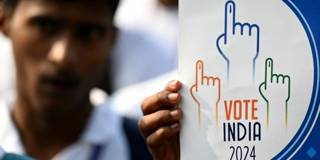Pakistan’s weak coalition government, which is propped up by the military, is unlikely to be able to undertake any bold diplomatic initiative toward India. Under these circumstances, India will probably be inclined to maintain its policy of watchful “benign neglect” toward its neighbor.
NEW DELHI – Among the many issues that will confront the government that emerges from India’s upcoming general election – running from April 19 through June 1 – one of the most important will be what to do about the country’s frayed relationship with its troubled neighbor, Pakistan. The answer may be simple: not much.
Until recently, there was some hope that elections in both countries in the first half of 2024 might create an opportunity for a fresh start. But any optimism about the bilateral relationship’s future quickly dissipated after Pakistan’s controversial February election: with the popular former Prime Minister Imran Khan and his Pakistan Tehreek-e-Insaf party having been barred from running, the new government’s legitimacy is widely challenged.
A weak Pakistani coalition government propped up by the military is unlikely to be able to undertake any bold diplomatic initiative toward India, especially because Khan’s supporters, who consider themselves unfairly deprived of power, are liable to challenge any significant policy change. Under these circumstances, India will probably be inclined to maintain its policy of watchful “benign neglect” toward Pakistan.

NEW DELHI – Among the many issues that will confront the government that emerges from India’s upcoming general election – running from April 19 through June 1 – one of the most important will be what to do about the country’s frayed relationship with its troubled neighbor, Pakistan. The answer may be simple: not much.
Until recently, there was some hope that elections in both countries in the first half of 2024 might create an opportunity for a fresh start. But any optimism about the bilateral relationship’s future quickly dissipated after Pakistan’s controversial February election: with the popular former Prime Minister Imran Khan and his Pakistan Tehreek-e-Insaf party having been barred from running, the new government’s legitimacy is widely challenged.
A weak Pakistani coalition government propped up by the military is unlikely to be able to undertake any bold diplomatic initiative toward India, especially because Khan’s supporters, who consider themselves unfairly deprived of power, are liable to challenge any significant policy change. Under these circumstances, India will probably be inclined to maintain its policy of watchful “benign neglect” toward Pakistan.